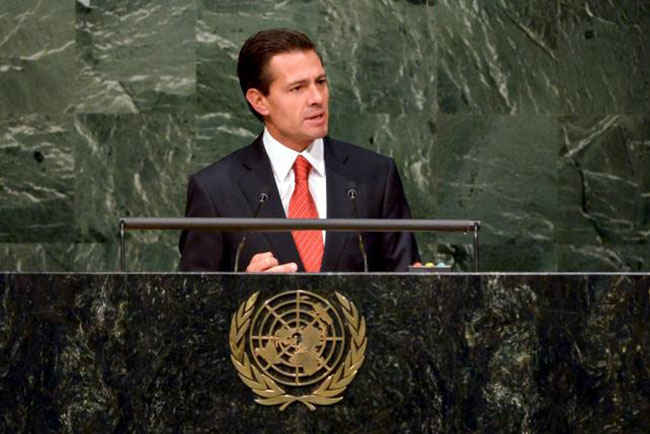UNITED NATIONS - The U.N. General Assembly gathered on Tuesday to rethink global strategy in the war on narcotics for the first time in two decades as activists, U.N. officials and world leaders cited an international trend towards more liberal drug laws.
Despite broad agreement on the need to deal with the global drug problem, there are deep divisions among the 193 U.N. member states, with some favouring a shift towards decriminalisation and a greater focus on reducing the harm caused both by narcotics abuse and the war on drugs.
A number of Latin American leaders say decades of aggressive war on drugs has failed, having killed or destroyed thousands of lives worldwide. They say there is an irreversible trend towards legalizing "soft drugs" such as marijuana and that it is time for U.N. bodies to support that trend.
But some major powers like Russia, delegates say, remain wary of the trend towards legalization and frown upon moves by U.S. states to regulate access to marijuana.
No major decisions are expected this week. But European and Latin American delegations and activists hope this week's special U.N. session taking stock of what many describe as the failed war on drugs can contribute to pushing the world a few steps closer towards a more liberal drug strategy that puts human rights and public health, not repression, at the centre.
"Evidence shows that prohibitionist approaches have not worked: from 1998 to 2008 the number of people using illicit drugs did not change significantly and neither did the area used for opium poppy cultivation," U.N. Assistant Secretary-General Magdy Martinez-Soliman wrote in the Guardian newspaper.
"Conventional policies have failed in reducing addiction and production," he said.
The General Assembly was set to adopt a declaration on Tuesday that activists supporting more liberal drug laws found disappointing. They said it focussed on the traditional approach of cutting off supply, not reducing the harm caused by narcotics and protecting human rights.
The Global Commission on Drug Policy, a non-governmental group that includes prominent figures such as billionaire philanthropist Richard Branson and former U.S. Secretary of State George Shultz, criticized the U.N. declaration as "long on rhetoric but short on substance."
Colombian President Juan Manuel Santos, also writing in the Guardian, said "the time has come for the world to transit into a different approach in its drug policy."
"This is not a call for legalization of drugs," said Santos, one of the most vocal critics of the criminalisation of drug use and the heavy-handed tactics of the war on drugs. "It is a call for recognition that between total war and legalization there exists a broad range of options worth exploring."
Santos said the goal was "to take better care of drug consumers, protect our youth from drug abuse, collaborate to continue combating organised crime and provide alternative economic means to illegal crop farmers and vulnerable communities."
He called for ending the death penalty for drug offences and mandatory treatment for drug abusers and appealed for replacing a repressive response with a more comprehensive approach focussing on prevention of drug abuse and non-prison rehabilitation for drug abusers.
A report by the medical journal the Lancet and Johns Hopkins University said last month that the examples of Portugal and the Czech Republic had shown that decriminalising non-violent offences produced compelling health benefits.
The report's authors called instead for an evidence-based approach, focussed on reducing harm by minimizing both the violence associated with drugs and the health risks, such as the transmission of HIV and hepatitis through shared needles. (Reuters)
Home » World » U.N. Reviews War on Drugs Amid Global Push for Liberalization
U.N. Reviews War on Drugs Amid Global Push for Liberalization

